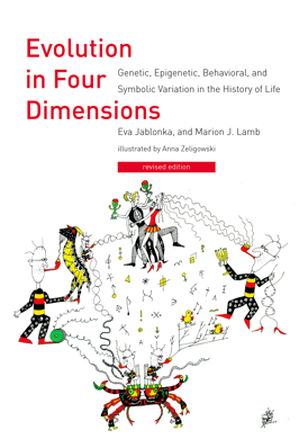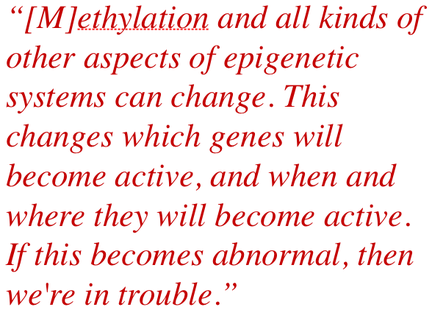Epigenetics: Evolutionary Theory in Transition
"During [embryogenesis] major changes occur in, for example, DNA methylation
and in other aspects of chromatin marking. When things are happening during these periods,
they can have long-term repercussions."

Dr. Eva Jablonka is a theoretical biologist and author of three books on non-genetic forms of evolution and epigenetics. Drawing from the realms of evolutionary, molecular, and behavioral biology, her work is considered by many to be ground-breaking and frequently ahead of her time. Jablonka's first book, Epigenetic Inheritance and Evolution: the Lamarckian Dimension, was published in 1995. She is currently a professor at the Cohn Institute for the History of Philosophy of Science and Ideas at Tel Aviv University. She received her Ph.D. in genetics from the Hebrew University, but her interests shifted to studying the philosophy of biology and theoretical biology. Her most recent book, authored with Marion Lamb, is called Evolution in Four Dimensions: Genetic, Epigenetic, Behavioral, and Symbolic Variation in the History of Life (MIT Press) and explores heritable variations transmitted from generation to generation through multiple channels.
Interviewed by Meeri Kim, PhD, March 2014
Interviewed by Meeri Kim, PhD, March 2014
|
What is wrong with the prevailing understanding and teaching of evolution?
As far as I know, the way evolution is taught is usually still very conservative. The way that it is taught is not incorporating epigenetics, for example. Some do teach epigenetics, but it is not in the major textbooks. But this is normal in the development of science — it takes awhile for things to get into the mainstream. I'm not upset about it, and I'm sure that this will change. Twenty years ago, epigenetics did not appear in any textbook, and unless you were specifically interested in it, you wouldn't know about it. When you're looking at young people today, the situation is better. It is still not the best because textbooks are not very good. But it is getting better, and it takes a long time, unfortunately. Our first book, Epigenetic Inheritance and Evolution: the Lamarckian Dimension, was published in 1995 — nearly 20 years ago. The title seemed horrible to people since they said, “Lamarckian is a bad word, we learnt to reject Lamarckism in high school,” "Using Lamarckian in the title will make people avoid the book" etc. and so on. We said, “Sorry, this is how we are going to call it, it is part of a scientific tradition that we want to acknowledge.” But on the whole, people thought it was a good and scholarly book, so it wasn't too bad. The message got through somehow, to some people.  Jablonka's work examines many evolutionary pressures. Jablonka's work examines many evolutionary pressures.
Do you already see a shift happening in the last few years regarding how people think about evolution?
Yes, I think there's been a huge shift, particularly within medicine and ecology. Even in evolutionary biology, people are beginning to study the epigenetics of populations and make theoretical models which are very important. So things are moving, but definitely the older generation of evolutionary biologists resists it. The younger generation of biologists is very interested —because it is clear that there is a huge potential for understanding disease and abnormalities through this discipline. It is important to keep things in proportion. Sometimes people think that epigenetics is a kind of magic key — that once we know the epigenetics, we'll know everything. Just like how we once thought that if we know DNA sequence, it will be the magic key to allow us to read the book of life. Now we're going to read the book of epigenetics. Truthfully, it won't be like that, but epigenetics will make the picture much better and more realistic. But it is not a sort of magic key that once you know the methylation pattern, or the histone modifications patterns you suddenly know everything. You have to understand it all in context. How did you become interested in epigenetics, especially quite early on compared to others in your field? I did my Ph.D. work on X-inactivation which is an epigenetic process. It was through a theoretical interest in what I was doing that I realized the basic mechanisms that underlie this type of phenomenon — an epigenetic mechanisms — may have much manifestations. There may be many, many extensions of this type of process. That's why I became interested in the effects of epigenetics on evolution. When I started exploring this with Marion Lamb, there were very few studies that showed actual trans-generational epigenetic inheritance at the molecular level. There were all kinds of information about strange inheritance patterns, but very very few were described at the molecular level. Also, there was nothing about the evolutionary implications of epigenetic inheritance, especially the direct implications, before we started working on it. There was absolutely nothing about the way that it can shape adaptive evolution, speciation, and similar processes. We're talking about the late 80's. People were working on epigenetics within the framework of developmental biology, but they weren't working on it within the framework of heredity and evolution. So since that time, there's been a lot of changes. Why is there resistance in academia to the idea of the environmentally responsive germline?
For a long time, there were no good mechanisms of epigenetic inheritance. Also, once these kinds of mechanisms were discovered, people had a hard time convincing their peers since it's an idea that was discredited for a long time. So in order to convince people that it's real, the wall to climb was very high. It was very difficult to convince people because you always can interpret results in alternative ways. It is difficult to prove something in a way that would satisfy everyone. You never do a perfect study — there are no such things. Things are always open to questioning, especially when people are suggesting something new. They have to know that something new won't be accepted without a lot of scrutiny. This is how science works. But again, it's not something that I was very worried about. It seemed to me at the time, and it seems to me now, that there is very good evidence for epigenetic inheritance. At the time, I thought there was very good indirect evidence, and the biological logic was compelling. So I was sure that the moment we will learn about the molecular aspects, the more we will discover to support this, and that was true. And that is exactly what is happening: the more we learn, the more we discover that these kinds of things are ubiquitous. What have we learned from animal models so far? Have they been informative? I think that the work on the nematode worm — on C. elegans — is very impressive. There is a lot of work in plants which is extremely good, both in plant ecology and lab experiments. In mammals, there are experiments that are very interesting, but we have less convincing results on long term inheritance than in plants and nematodes. I think researchers have to be very sophisticated in the way they perform the experiments. It's such a complicated system. But I think improvements in technology are helping, and it is possible to do excellent and informative experiments. There are some very surprising results that people are discovering — surprising to me, even. What are the windows of environmental susceptibility for the germline (male and female)? Most people will say that in mammals, when there is this migration of germline cells to the genital regions (during embryonic development), this is a very sensitive period. So this period throughout differentiation of the germline is a very sensitive period. We don't know enough about the sensitive periods, but there is also a sensitive period at early embryogenesis, when chromatin structure is altered in a global way. During these sensitive periods major changes occur in, for example, DNA methylation and in other aspects of chromatin marking. When things are happening during these periods, they can have long-term repercussions. But in general, it seems that the embryo is very susceptible to enduring epigenetic modifications, that the epigenome of the embryo is very labile. That is what experiments suggest. But overall, we don't know enough about windows and differences between sexes as well. I think the windows of susceptibility for males and females are different because the germline of the female is formed during embryogenesis and then that's it. Whereas in males, the factory is working all the time, so to speak. I think the period of susceptibility for males is also during the preadolescent stages beginning at 8 or 9 years old. Again, this is what some experiments and observations are suggesting. Of course there can be differences between different species which are important to bar in mind. Germline development is a highly evolutionarily conserved process. Is the biology and vulnerability of the human germline different from that of other mammals? We don't know enough about humans. We know more about mice than we know about humans, but I think that the mechanisms are basically the same. Of course, the longevity is different, and we are not mice. But even if we err, we should err on the side of caution. If we learn something from mice, we have to be very careful before translating it to humans. 
What do we know about molecular-level vulnerabilities of the human germline?
What we know is that methylation and all kinds of other aspects of epigenetic systems can change. This changes which genes will become active, and when and where they will become active. If this becomes abnormal, then we're in trouble. There are all kinds of experiments that are showing that all kinds of stresses can have long-term effects, and this can be transferred not only through females but also through males. We know this happens both in mice and in rats. How long it can this effect last? We don't know. Two generations, for sure; in some cases, more than two — maybe three or four. It is something that should alert us to be very careful about these stresses, and for us to do long term epidemiological studies. This is what we need to do. We aren't doing it now, but we should be. Should the germline epigenetics paradigm change our approach to testing and regulating chemicals and pharmaceuticals? Epigenetic inheritance is new stuff. Testing for its effects requires very long term experimentation and studies, and people want solutions quickly. Can you wait 25 years for a medication? But companies should at least investigate first with animal models, although we're not sure that would tell us the whole story. I think that as people become more aware of transgenerational effects of chemicals and toxins, then companies will start testing for them. But it will take time, and I would guess that there would be resistance from companies because testing would mean that it would take a very long time to come out with new medicines. They also have to do the calculation of whether it is worth waiting that long, even if there are risks. But overall, I think they should test for transgenerational effects, definitely, even if one is ready to take risks. We are not doing enough long-term epidemiological studies, which are very important both from the research point and from the health point. One can say that it is easy for me to talk — I'm a theoretical biologist, so I can just think about these things and it does not hamper my work. Nevertheless, I feel very strongly that this kind of testing should be done. What are the four dimensions of evolution, as outlined in your latest book with Marion Lamb? When we think about heredity and evolution, especially when it comes to mammals or humans, we have the genetic dimension. But you have to think about all the inputs into your development — the inputs that make a difference to who you are, not just the genetic, DNA inputs. Genetic differences matter, of course, and epigenetic differences as well. Then there would be a lot of aspects you acquired from your parents. Say they you were not fed enough, or abused during early infancy — all these kinds of things. These represent the inheritance of aspects that can affect behaviors and even behavioral traditions. Lastly, we have the inputs into what we become through the symbolic system: language, culture, all the things that make us specifically human. The surprising thing is that these inputs factor not only into development, but they also influence evolution. We know that genes are transmitted from generation to generation. Now we also know that epigenetic variations are transmitted. There are all kinds of behavioral variations or substances that can be transmitted from generation to generation — not through the germline, but nevertheless they can have effects on subsequent generations. Through the symbolic system, a lot of information is transmitted as well. There are different routes of transmission of information which are affecting development and evolution. This is what our book is about: it's trying to give you a picture of evolution that is broader, richer, and more true to life than what we usually think about. When you think through this picture and its implications, you see that it gives you a very different view of relationships between, say, biology and culture, or biology and social systems, biology and ecology. You think about ecology in different ways once you incorporate this type of multidimensional thinking. People are becoming aware of this, it seems, which is very nice and encouraging for us. Tell me about your recent research interests. Right now, I'm very interested in the epigenetics of the nervous system. It is extremely interesting, so I'm beginning to educate myself about this subject. A lot of work has been done in the last decade, especially the last 4 years. For instance, it seems like when animals learn, there are robust changes in their epigenetic markings on particular genes — changes in DNA methylation and histones. You can learn something, and these new epigenetic marks will stay for a long time in the nervous system. The epigenetic changes are a manifestation of some memory, but they are also necessary for memory as we understand it on the higher behavioral level, for learning. There is a connection between memory at the molecular level and memory at the neural/mental/behavioral level. I find that fascinating. What are the dynamics of this establishment of the cell memory? How is it related to memory at the behavioral level during and after learning? These are things that people are beginning to study and trying to understand. It is a very complicated question. |
Read More Expert Interviews:
Epigenetics: Evolutionary Theory in Transition Eva Jablonka, PhD,Tel Aviv University Gene-Environment Interaction in the Etiology of Autism Spectrum Disorders Alycia Halladay, PhD, Chief Science Officer, Autism Science Foundation The Role of Epigenetics in Autism Spectrum Disorders Janine LaSalle, PhD, Professor, Center for Neuroscience, UC Davis Prenatal Stressors and Epigenetics in the Development of Behavioral Disorders Tracy Bale, PhD, Professor Neuroscience in Psychiatry, University of Pennsylvania Epigenetic Effects of Prenatal Alcohol Exposure Ben Laufer, Epigeneticist, Western University, Canada Environmental Exposures and Our Dynamic Epigenome Linda Birnbaum, PhD, Director, National Institute of Environmental Health Sciences The Effects of Endocrine Disrupting Chemicals Carol Kwiatkowski, PhD, Executive Director and Senior Research Associate, The Endocrine Disruption Exchange Germline Effects of In Utero Exposure to Nicotine Pradeep Bhide, PhD, Professor of Developmental Neuroscience, Florida State University Ascertaining Germline Risks of Chemical Exposures Carole Yauk, PhD, and Francesco Marchetti, PhD, Research Scientists, Health Canada, and Adjunct Professors, Carleton University How Epigenetics Influences the Risk of Disease Susan Murphy, PhD, Associate Professor and Director of the Epigenetics Research Laboratory, Duke University Medical Center Developmental Origins of Disease Jerry Heindel, PhD, Population Health Branch, National Institute of Environmental Health Sciences Persistent Epigenetic Consequences of Critical-Window Exposures Carlos Guerrero-Bosagna, PhD, Linkoping University, Sweden Assisted Fertility and Epigenetic Disruption Marisa Bartolomei, PhD, University of Pennsylvania Public Health Implications of Epigenetics Andrea Baccarelli, MD, PhD, Harvard University The Developing Genome David Moore, PhD, Pitzer College New Discoveries in Genomic Imprinting Catherine Dulac, PhD, Harvard University What Glowing Worms Teach Us About Germ Cell Toxicity Patrick Allard, PhD, UCLA How Exposures Can Modify the Epigenome Dana Dolinoy, PhD, Assistant Professor in Environmental Health Sciences, University of Michigan Effects of Exposures on Development of Oocytes Patricia Hunt, PhD, Professor, School of Molecular Biosciences, Washington State University Epigenetics of Human Germline Development Amander Clark, PhD, Department of Molecular, Cell and Developmental Biology, UCLA Multigenerational Effects of Endocrine-Disrupting Molecules Emilie Rissman, PhD, Professor of Biochemistry & Molecular Genetics, University of Virginia How Environmental Factors Can Change the Epigenetics of the Germline Mirella Meyer-Ficca, PhD, Research Assistant Professor, Utah State University Imprinting, Gene Regulation, and Early Development Randy Jirtle, PhD, University of Wisconsin-Madison, School of Medicine and Public Health Dimensions in Autism Genetics Wendy Chung, MD, PhD, Columbia University School of Medicine Connecting Exposures to Epigenetic Effects Cheryl Walker, PhD, Welch Chair and Director, Institute of Biosciences & Technology, Texas A&M University Germline Effects of Maternal Smoking: New Study Shows Permanent Impairments to Sperm Eileen McLaughlin, PhD, University of Newcastle Genomic Imprinting: Regulation of Maternal and Paternal Genes Matter in Brain Development Christopher Gregg, PhD, University of Utah Fetal Origins of Disease: Small Disruptions, Big Effects Carmen Marsit, PhD, Dartmouth Medical School Adverse Multigenerational Effects of Smoking Virender Rehan, MD, UCLA Seeking Epigenetic Clues in Autism Epidemiology Dani Fallin, PhD, Johns Hopkins University Coming soon |
